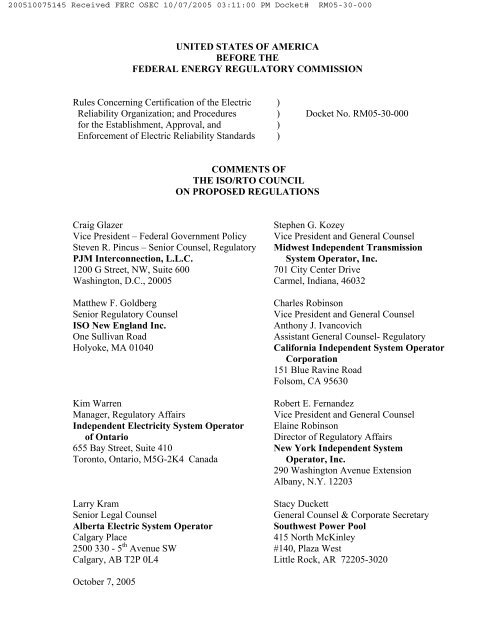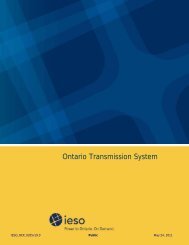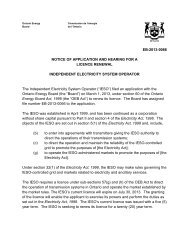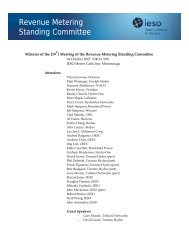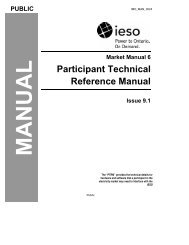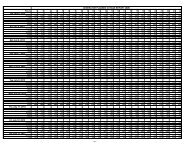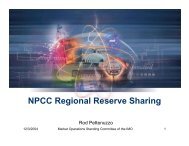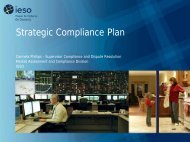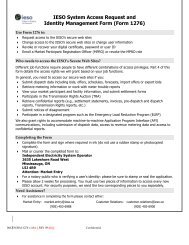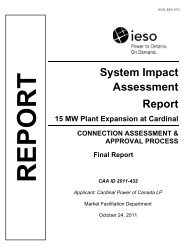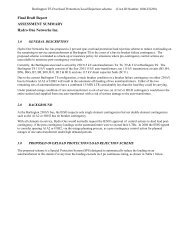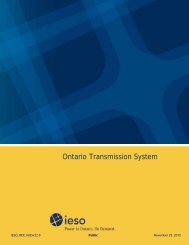ISO/RTO Council Comments on ERO NOPR - IESO
ISO/RTO Council Comments on ERO NOPR - IESO
ISO/RTO Council Comments on ERO NOPR - IESO
- No tags were found...
You also want an ePaper? Increase the reach of your titles
YUMPU automatically turns print PDFs into web optimized ePapers that Google loves.
200510075145 Received FERC OSEC 10/07/2005 03:11:00 PM Docket# RM05-30-000UNITED STATES OF AMERICABEFORE THEFEDERAL ENERGY REGULATORY COMMISSIONRules C<strong>on</strong>cerning Certificati<strong>on</strong> of the Electric )Reliability Organizati<strong>on</strong>; and Procedures ) Docket No. RM05-30-000for the Establishment, Approval, and )Enforcement of Electric Reliability Standards )COMMENTS OFTHE <str<strong>on</strong>g>ISO</str<strong>on</strong>g>/<str<strong>on</strong>g>RTO</str<strong>on</strong>g> COUNCILON PROPOSED REGULATIONSCraig GlazerVice President – Federal Government PolicySteven R. Pincus – Senior Counsel, RegulatoryPJM Interc<strong>on</strong>necti<strong>on</strong>, L.L.C.1200 G Street, NW, Suite 600Washingt<strong>on</strong>, D.C., 20005Matthew F. GoldbergSenior Regulatory Counsel<str<strong>on</strong>g>ISO</str<strong>on</strong>g> New England Inc.One Sullivan RoadHolyoke, MA 01040Kim WarrenManager, Regulatory AffairsIndependent Electricity System Operatorof Ontario655 Bay Street, Suite 410Tor<strong>on</strong>to, Ontario, M5G-2K4 CanadaLarry KramSenior Legal CounselAlberta Electric System OperatorCalgary Place2500 330 - 5 th Avenue SWCalgary, AB T2P 0L4Stephen G. KozeyVice President and General CounselMidwest Independent Transmissi<strong>on</strong>System Operator, Inc.701 City Center DriveCarmel, Indiana, 46032Charles Robins<strong>on</strong>Vice President and General CounselAnth<strong>on</strong>y J. IvancovichAssistant General Counsel- RegulatoryCalifornia Independent System OperatorCorporati<strong>on</strong>151 Blue Ravine RoadFolsom, CA 95630Robert E. FernandezVice President and General CounselElaine Robins<strong>on</strong>Director of Regulatory AffairsNew York Independent SystemOperator, Inc.290 Washingt<strong>on</strong> Avenue Extensi<strong>on</strong>Albany, N.Y. 12203Stacy DuckettGeneral Counsel & Corporate SecretarySouthwest Power Pool415 North McKinley#140, Plaza WestLittle Rock, AR 72205-3020October 7, 2005
200510075145 Received FERC OSEC 10/07/2005 03:11:00 PM Docket# RM05-30-000UNITED STATES OF AMERICABEFORE THEFEDERAL ENERGY REGULATORY COMMISSIONRules C<strong>on</strong>cerning Certificati<strong>on</strong> of the Electric )Reliability Organizati<strong>on</strong>; and Procedures ) Docket No. RM05-30-000for the Establishment, Approval, and )Enforcement of Electric Reliability Standards )COMMENTS OFTHE <str<strong>on</strong>g>ISO</str<strong>on</strong>g>/<str<strong>on</strong>g>RTO</str<strong>on</strong>g> COUNCILON PROPOSED REGULATIONSThe <str<strong>on</strong>g>ISO</str<strong>on</strong>g>/<str<strong>on</strong>g>RTO</str<strong>on</strong>g> <str<strong>on</strong>g>Council</str<strong>on</strong>g> (“IRC”) 1respectfully submits its comments <strong>on</strong> theregulati<strong>on</strong>s proposed by the Commissi<strong>on</strong> to implement secti<strong>on</strong> 215 of the Federal PowerAct (“FPA”), as added by the Electricity Modernizati<strong>on</strong> Act of 2005, c<strong>on</strong>cerningmandatory reliability standards.1The nine functi<strong>on</strong>ing Independent System Operators (“<str<strong>on</strong>g>ISO</str<strong>on</strong>g>s”) and Regi<strong>on</strong>alTransmissi<strong>on</strong> Organizati<strong>on</strong> (“<str<strong>on</strong>g>RTO</str<strong>on</strong>g>s”) in North America formed the IRC in April 2003.The IRC’s missi<strong>on</strong> is to work collaboratively to develop effective processes, tools andstandard methods for improving competitive electricity markets across North America.In fulfilling this missi<strong>on</strong>, it is the IRC’s goal to provide a perspective that balancesreliability standards with market practices so that each complements the other. The IRCis comprised of the Alberta Electric System Operator (“AESO”), California IndependentSystem Operator Corporati<strong>on</strong> (“CA<str<strong>on</strong>g>ISO</str<strong>on</strong>g>”), the Independent Electricity System Operatorof Ontario (“<strong>IESO</strong>”), <str<strong>on</strong>g>ISO</str<strong>on</strong>g> New England, Inc. (“<str<strong>on</strong>g>ISO</str<strong>on</strong>g>-NE”), Midwest IndependentTransmissi<strong>on</strong> System Operator, Inc. (Midwest <str<strong>on</strong>g>ISO</str<strong>on</strong>g>”), New York Independent SystemOperator, Inc. (“NY<str<strong>on</strong>g>ISO</str<strong>on</strong>g>”), PJM Interc<strong>on</strong>necti<strong>on</strong>, LLC (“PJM”), the Electric Reliability<str<strong>on</strong>g>Council</str<strong>on</strong>g> of Texas (“ERCOT”), and the Southwest Power Pool (“SPP”). The AESO and<strong>IESO</strong> are not subject to this Commissi<strong>on</strong>’s jurisdicti<strong>on</strong>. While the AESO and <strong>IESO</strong>c<strong>on</strong>cur with these joint comments of the <str<strong>on</strong>g>ISO</str<strong>on</strong>g>/<str<strong>on</strong>g>RTO</str<strong>on</strong>g> <str<strong>on</strong>g>Council</str<strong>on</strong>g>, this c<strong>on</strong>currence should notbe c<strong>on</strong>strued as agreement or acknowledgement that their organizati<strong>on</strong>s are subject to thisCommissi<strong>on</strong>’s jurisdicti<strong>on</strong>. ERCOT is submitting separate comments under this docketand has elected not to be a signatory to these joint comments of the <str<strong>on</strong>g>ISO</str<strong>on</strong>g>/<str<strong>on</strong>g>RTO</str<strong>on</strong>g> <str<strong>on</strong>g>Council</str<strong>on</strong>g>.Certain of the members of the IRC may submit individual comments as welladdressing additi<strong>on</strong>al issues specific to their respective regi<strong>on</strong>s.
200510075145 Received FERC OSEC 10/07/2005 03:11:00 PM Docket# RM05-30-000I. INTRODUCTIONThe IRC supports the development of clear and enforceable internati<strong>on</strong>alreliability standards. The lack of clear standards in the past has helped c<strong>on</strong>tribute toc<strong>on</strong>cerns with enforceability, and c<strong>on</strong>sistency am<strong>on</strong>g regi<strong>on</strong>s. Moreover, a lack ofclearly defined roles between the electric reliability organizati<strong>on</strong> (“<strong>ERO</strong>”), regi<strong>on</strong>alentities, <str<strong>on</strong>g>RTO</str<strong>on</strong>g>s/<str<strong>on</strong>g>ISO</str<strong>on</strong>g>s, and other c<strong>on</strong>trol area operators can <strong>on</strong>ly work to further c<strong>on</strong>fuse analready crowded playing field. The IRC’s comments will help the Commissi<strong>on</strong> ensureclearly defined roles for all entities charged with ensuring reliability, as well as providean analytical tool for resolving the tensi<strong>on</strong> in the Notice of Proposed Rulemaking(“<strong>NOPR</strong>”) c<strong>on</strong>cerning issues associated with North American vs. regi<strong>on</strong>al standards andthe interplay between approved tariff provisi<strong>on</strong>s and new reliability standards.The key to assuring a workable regime for managing the reliability of the NorthAmerican bulk power system lies in certain key principles:1. Ensure Clear, Internati<strong>on</strong>ally Applicable Standards---To ensure thatreliability standards are truly internati<strong>on</strong>al in scope and capable of enforcement acrossthree countries, they should clearly reflect the “what” not the “how” of reliability. Inshort, the <strong>ERO</strong>’s role should be to promulgate standards and impose appropriatesancti<strong>on</strong>s for violati<strong>on</strong>s. Implementati<strong>on</strong> of the standards should be left to c<strong>on</strong>trol areaoperators and system planners, including <str<strong>on</strong>g>RTO</str<strong>on</strong>g>s and <str<strong>on</strong>g>ISO</str<strong>on</strong>g>s, in accordance with theirapproved tariffs and detailed operating procedures.2. Develop N<strong>on</strong>-Discriminatory Standards Adaptable to All Regi<strong>on</strong>s---ClearNorth American standards also should be neutral in their impact <strong>on</strong> areas with organizedmarkets and areas without such markets. If standards are neutral in their market impact,2
200510075145 Received FERC OSEC 10/07/2005 03:11:00 PM Docket# RM05-30-000am<strong>on</strong>g the North American Electric Reliability <str<strong>on</strong>g>Council</str<strong>on</strong>g> (“NERC”), the regi<strong>on</strong>alreliability councils (or their delegates) (“RRCs”), and the <str<strong>on</strong>g>ISO</str<strong>on</strong>g>/<str<strong>on</strong>g>RTO</str<strong>on</strong>g>s, as follows:CURRENT DIVISION OF RELIABILITY REPONSIBILITIESNERC (What) RRC <str<strong>on</strong>g>RTO</str<strong>on</strong>g>/<str<strong>on</strong>g>ISO</str<strong>on</strong>g> (HOW)· M<strong>on</strong>itors its entitiesfor compliance withstandards· Enforces thepenalties and sancti<strong>on</strong>s <strong>on</strong>entities within its area forn<strong>on</strong>-compliance· Develops c<strong>on</strong>sensusstandards for all ofNorth America· Delegates to RRCthe resp<strong>on</strong>sibility andauthority for m<strong>on</strong>itoringcompliance to theNERC standards· Delegates to theRRC the resp<strong>on</strong>sibilityand authority forenforcing the penaltiesand sancti<strong>on</strong>s for n<strong>on</strong>complianceto NERCstandards· C<strong>on</strong>ducts audits ofits BalancingAuthorities,Transmissi<strong>on</strong> Operators,and ReliabilityCoordinators to ensurethat they have thenecessary tools to becompliant with theNERC standards⋅Develops regi<strong>on</strong>alinput to standards andpolicies· Implementspractices, rules, markets,and procedures toensure compliance withthe standards· Enforces its ownrules and implementspenalties or sancti<strong>on</strong>s(such as n<strong>on</strong>-marketparticipati<strong>on</strong>) when itsmembers do not followthe <str<strong>on</strong>g>RTO</str<strong>on</strong>g>/<str<strong>on</strong>g>ISO</str<strong>on</strong>g> rules4. Provide Definitive Criteria for Determining Whether a Standard Is Justand Reas<strong>on</strong>able ---The Commissi<strong>on</strong> should set forth clear criteria as to how it will judgethe justness and reas<strong>on</strong>ableness of a proposed standard. The IRC sets forth eight specificcriteria (at pages 14-15 of these comments) that the Commissi<strong>on</strong> should review inapplying the just and reas<strong>on</strong>able standard.4
200510075145 Received FERC OSEC 10/07/2005 03:11:00 PM Docket# RM05-30-0005. Where Justified, Individual Regi<strong>on</strong>s Should Be Authorized to HaveReliability Rules that Are More Stringent than, but C<strong>on</strong>sistent with, <strong>ERO</strong> Standards ---Finally, the Commissi<strong>on</strong> should not interpret the Electricity Modernizati<strong>on</strong> Act asrequiring it to prohibit individual regi<strong>on</strong>s from having rules that are more stringent than,but also c<strong>on</strong>sistent with, <strong>ERO</strong> standards. To do so would be to c<strong>on</strong>strue the Act, whichwas intended to enhance reliability, as forcing some regi<strong>on</strong>s to have weaker standardsthan they do today. C<strong>on</strong>versely, it would be no soluti<strong>on</strong> to require, in the name ofstandardizati<strong>on</strong>, that all regi<strong>on</strong>s must adopt more rigorous requirements that weredesigned for some other regi<strong>on</strong>s, whether or not those stricter standards are needed in allregi<strong>on</strong>s.Accordingly, where clearly justified to support specific, identifiable regi<strong>on</strong>alneeds, regi<strong>on</strong>al standards (including more stringent standards) should be allowed. By thesame token, the Commissi<strong>on</strong> should make clear that the regi<strong>on</strong>al standards that it and the<strong>ERO</strong> will accept will not become a ready substitute for properly formulated internati<strong>on</strong>alstandards.II.COMMENTS ON SPECIFIC PROVISIONSA. Secti<strong>on</strong> 38.3 – How Should the Commissi<strong>on</strong> Define “End-Users” forPurposes of the Statutory Requirement that The <strong>ERO</strong> Must EstablishRules that “Allocate Equitably” its Charges “Am<strong>on</strong>g End-Users?”<strong>NOPR</strong> at P 43.The IRC supports use of net energy for load as the appropriate measure forallocating the costs of the <strong>ERO</strong>. Loads are the ultimate beneficiaries of system reliability,and therefore are properly allocated the costs of the reliability organizati<strong>on</strong>. Moreover,5
200510075145 Received FERC OSEC 10/07/2005 03:11:00 PM Docket# RM05-30-000load should be assessed for purposes of the statute whether that load is in a bundled staterather than an unbundled state, or in a traditi<strong>on</strong>al vertically integrated utility serviceterritory rather than an <str<strong>on</strong>g>ISO</str<strong>on</strong>g>/<str<strong>on</strong>g>RTO</str<strong>on</strong>g> regi<strong>on</strong>. C<strong>on</strong>gress provided the Commissi<strong>on</strong> withauthority over “all users . . . of the bulk-power system.” FPA secti<strong>on</strong> 215(b)(1).Exempting some bundled loads based <strong>on</strong> locati<strong>on</strong> would impose a disproporti<strong>on</strong>ate shareof <strong>ERO</strong> costs <strong>on</strong> <str<strong>on</strong>g>ISO</str<strong>on</strong>g>/<str<strong>on</strong>g>RTO</str<strong>on</strong>g> regi<strong>on</strong>s, and thus effectively penalize entities that choose toparticipate in <str<strong>on</strong>g>ISO</str<strong>on</strong>g>s/<str<strong>on</strong>g>RTO</str<strong>on</strong>g>s.This c<strong>on</strong>cern stems from the <str<strong>on</strong>g>ISO</str<strong>on</strong>g>s/<str<strong>on</strong>g>RTO</str<strong>on</strong>g>s’ experience with the Commissi<strong>on</strong>’sexisting rules for allocating the annual fees that fund its regulatory programs under OrderNo. 641. 4Under this regime, market participants in <str<strong>on</strong>g>ISO</str<strong>on</strong>g>/<str<strong>on</strong>g>RTO</str<strong>on</strong>g> regi<strong>on</strong>s pay higherassessments than those in n<strong>on</strong>-<str<strong>on</strong>g>ISO</str<strong>on</strong>g>/<str<strong>on</strong>g>RTO</str<strong>on</strong>g> regi<strong>on</strong>s. In Order No. 641, the Commissi<strong>on</strong>eliminated the requirement that wholesale market sales be subject to the annual charges;instead, Order No. 641 mandated that electric program costs be allocated entirely <strong>on</strong> thebasis of reported transmissi<strong>on</strong> service volumes. The Commissi<strong>on</strong> c<strong>on</strong>cluded that nearlyall retail sales within <str<strong>on</strong>g>ISO</str<strong>on</strong>g>/<str<strong>on</strong>g>RTO</str<strong>on</strong>g> regi<strong>on</strong>s would be reflected in the unbundled transmissi<strong>on</strong>volumes reported. Meanwhile, <strong>on</strong>ly unbundled retail sales would count in the formulafor loads outside of <str<strong>on</strong>g>ISO</str<strong>on</strong>g>/<str<strong>on</strong>g>RTO</str<strong>on</strong>g> regi<strong>on</strong>s. In the IRC’s view, this rule meant that <str<strong>on</strong>g>ISO</str<strong>on</strong>g>/<str<strong>on</strong>g>RTO</str<strong>on</strong>g>members subject to the annual electric program charges would be allocated adisproporti<strong>on</strong>ate share of the costs. The Commissi<strong>on</strong> here has an opportunity to developa funding mechanism that fairly and rati<strong>on</strong>ally allocates costs am<strong>on</strong>g all affected entities,and the IRC urges it to do so in the final rule.4Revisi<strong>on</strong> of Annual Charges Assessed to Public Utilities, Order No. 641, 1996-2000 FERC Stats. & Regs., Regs. Preambles 31,109 (2000), reh’g denied, OrderNo. 641-A, 94 FERC 61,290 (2001).6
200510075145 Received FERC OSEC 10/07/2005 03:11:00 PM Docket# RM05-30-000Moreover, transmissi<strong>on</strong> facility owners and operators should not be allocated ashare of <strong>ERO</strong> costs, except to the extent they also act as load-serving entities. Facilitiesdo not exist for their own right, but to serve loads. If transmissi<strong>on</strong> owners and operatorswere to also be assessed, end users could face paying twice for the reliability functi<strong>on</strong>s ofthe <strong>ERO</strong> and the regi<strong>on</strong>al entities—<strong>on</strong>ce through charges assessed against an <str<strong>on</strong>g>RTO</str<strong>on</strong>g>/<str<strong>on</strong>g>ISO</str<strong>on</strong>g>,an ITC, or the transmissi<strong>on</strong> functi<strong>on</strong> of a vertically integrated company, and a sec<strong>on</strong>dtime through an assessment against their load serving entity. To avoid this potentialdouble count, end users should be assessed through their load serving entity. This wouldnot preclude, however, an <str<strong>on</strong>g>ISO</str<strong>on</strong>g> or <str<strong>on</strong>g>RTO</str<strong>on</strong>g> acting as a billing agent for <strong>ERO</strong> charges, to takeadvantage of existing settlement systems. Such settlement logistics should be left to theinvolved parties to arrange as appropriate.B. Secti<strong>on</strong> 38.4 – Approval of Reliability Standards1. Deference to Regi<strong>on</strong>al StandardsFPA secti<strong>on</strong> 215(d)(2) provides that the Commissi<strong>on</strong> is to give “due weight” tothe technical expertise of the <strong>ERO</strong> with respect to the c<strong>on</strong>tent of North Americanreliability standards, and to the technical expertise of a regi<strong>on</strong>al entity formed <strong>on</strong> aninterc<strong>on</strong>necti<strong>on</strong>-wide basis as to the c<strong>on</strong>tent of reliability standards applicable within thatinterc<strong>on</strong>necti<strong>on</strong>. 5Secti<strong>on</strong> 215(d)(3) provides that the <strong>ERO</strong> shall rebuttably presume thata reliability standard proposal from a regi<strong>on</strong>al entity formed <strong>on</strong> an interc<strong>on</strong>necti<strong>on</strong>-widebasis is just, reas<strong>on</strong>able, not unduly discriminatory or preferential, and in the publicinterest. The statute is silent <strong>on</strong> the deference to be afforded regi<strong>on</strong>al entities that5As discussed in the following secti<strong>on</strong> of these <str<strong>on</strong>g>Comments</str<strong>on</strong>g>, the statute provides thatthe Commissi<strong>on</strong> “shall not defer” with respect to a reliability standard’s effect <strong>on</strong>competiti<strong>on</strong>.7
200510075145 Received FERC OSEC 10/07/2005 03:11:00 PM Docket# RM05-30-000comprise less than an entire interc<strong>on</strong>necti<strong>on</strong>. Moreover, the statute does not require theCommissi<strong>on</strong>, in its review of a reliability standard, to afford either the <strong>ERO</strong> or a regi<strong>on</strong>alentity formed <strong>on</strong> an interc<strong>on</strong>necti<strong>on</strong>-wide basis the benefit of any presumpti<strong>on</strong> that aproposed reliability standard meets the statutory standards.The Commissi<strong>on</strong> must be careful that its implementati<strong>on</strong> of these provisi<strong>on</strong>spromotes str<strong>on</strong>g and clear reliability standards for the North American power grid, anddoes not lead to balkanizati<strong>on</strong> of that grid <strong>on</strong> reliability matters. The <strong>ERO</strong>’s clearc<strong>on</strong>tinent-wide reliability standards should be both str<strong>on</strong>g and broad—designed in thefirst place with awareness of such regi<strong>on</strong>al implementati<strong>on</strong> issues as local gridtopography and reliance <strong>on</strong> organized markets. Regi<strong>on</strong>al variances in standards can thenbe targeted to legitimate regi<strong>on</strong>al needs, leaving any further regi<strong>on</strong>al or local c<strong>on</strong>cerns tobe addressed through implementati<strong>on</strong>, and thus not end up swallowing C<strong>on</strong>gress’ overallintent that there be a single internati<strong>on</strong>al electric reliability organizati<strong>on</strong> promulgatingreliability standards. Neither the Commissi<strong>on</strong> nor the <strong>ERO</strong> should “over-read” therebuttable presumpti<strong>on</strong> language (which is <strong>on</strong>ly an evidentiary procedure) as carteblanche for creating a vastly different system of standards development and regulatoryoversight between the western and eastern interc<strong>on</strong>necti<strong>on</strong>s. The Commissi<strong>on</strong> alsoshould make clear that it will respect the technical expertise of a regi<strong>on</strong>al entity organized<strong>on</strong> less than an interc<strong>on</strong>necti<strong>on</strong>-wide basis 6 and the fact that some such regi<strong>on</strong>s may needto have more stringent reliability rules.6The existing regi<strong>on</strong>al reliability councils, whether or not formed <strong>on</strong> aninterc<strong>on</strong>necti<strong>on</strong>-wide basis, have c<strong>on</strong>siderable expertise in the specificcharacteristics of the porti<strong>on</strong>s of the bulk power system in their regi<strong>on</strong>s; and withcoordinating how operati<strong>on</strong>s in their regi<strong>on</strong> impact other operators in such regi<strong>on</strong>,or impact other regi<strong>on</strong>s in the relevant interc<strong>on</strong>necti<strong>on</strong>. For example, the existing8
200510075145 Received FERC OSEC 10/07/2005 03:11:00 PM Docket# RM05-30-000As explained below, however, the Commissi<strong>on</strong> appears to have started off <strong>on</strong> thewr<strong>on</strong>g foot <strong>on</strong> this topic by over-reading C<strong>on</strong>gress’s intent both as to the deferencerequired for the regi<strong>on</strong>al entity in part of the country and the deference due to regi<strong>on</strong>alentities in other parts of the country.a. The Commissi<strong>on</strong> Should Correct any Misimpressi<strong>on</strong> that aRebuttable Presumpti<strong>on</strong> Applies to the Commissi<strong>on</strong>’sReview of Interc<strong>on</strong>necti<strong>on</strong>-Wide Regi<strong>on</strong>al EntityReliability Standards.The <strong>NOPR</strong> (at P 45) mischaracterizes the statute as attaching a rebuttablepresumpti<strong>on</strong> to proposals by an interc<strong>on</strong>necti<strong>on</strong>-wide regi<strong>on</strong>al entity. Rather, by designthe statute provides <strong>on</strong>ly that the <strong>ERO</strong> is to afford such a presumpti<strong>on</strong> in its c<strong>on</strong>siderati<strong>on</strong>of proposals from such an entity. No such presumpti<strong>on</strong> is provided for the Commissi<strong>on</strong>’sc<strong>on</strong>siderati<strong>on</strong> of such proposals. Accordingly, the IRC requests that the Commissi<strong>on</strong>make clear that it will not adopt a rebuttable presumpti<strong>on</strong> in favor of such proposals in itsreview proceedings.b. The Commissi<strong>on</strong> Should Clarify How the RebuttablePresumpti<strong>on</strong> Applies in the <strong>ERO</strong>’s Review ofInterc<strong>on</strong>necti<strong>on</strong>-Wide Regi<strong>on</strong>al Entity Reliability StandardsThe Commissi<strong>on</strong> also should make clear that the rebuttable presumpti<strong>on</strong> to beafforded by the <strong>ERO</strong> is an evidentiary presumpti<strong>on</strong>, not a requirement to merely acceptany proposal. Given the importance of reliability, the <strong>ERO</strong> cannot be a passive recipientregi<strong>on</strong>al reliability councils in the Eastern Interc<strong>on</strong>necti<strong>on</strong> often comprise tightlyinterc<strong>on</strong>nected regi<strong>on</strong>s–sometimes across nati<strong>on</strong>al borders–and therefore offer adeep repository of knowledge <strong>on</strong> the operati<strong>on</strong>, planning, and coordinati<strong>on</strong> ofthose regi<strong>on</strong>s. The existing regi<strong>on</strong>al reliability councils also provide valuableassistance to <str<strong>on</strong>g>RTO</str<strong>on</strong>g>s and <str<strong>on</strong>g>ISO</str<strong>on</strong>g>s as they work with their stakeholders to implementNorth American-wide reliability standards, by advising and ensuring thatimplementati<strong>on</strong> measures adopted by individual system operators do notinadvertently impact other operators of the bulk power system.9
200510075145 Received FERC OSEC 10/07/2005 03:11:00 PM Docket# RM05-30-000of proposed reliability standards. Just as the Commissi<strong>on</strong>’s staff still investigates thefacts and develops evidence in cases where the applicant enjoys a rebuttable presumpti<strong>on</strong><strong>on</strong> a given issue, the staff of the North American <strong>ERO</strong> still should have a duty to collector develop informati<strong>on</strong> <strong>on</strong> the advantages and disadvantages of proposals from aninterc<strong>on</strong>necti<strong>on</strong>-wide regi<strong>on</strong>al entity. In carrying out this duty, the <strong>ERO</strong> should complywith basic due process requirements, such as public notice and a reas<strong>on</strong>able opportunityto be heard. 7Following such due diligence, however, if no informati<strong>on</strong> rebutting thepresumpti<strong>on</strong> is presented, then the <strong>ERO</strong> would accept the standard.c. The Commissi<strong>on</strong> Should Clarify the “Due Weight” It WillAfford <strong>ERO</strong> and Interc<strong>on</strong>necti<strong>on</strong>-Wide Regi<strong>on</strong>al EntityReliability Standards; and Acknowledge that It will AffordAppropriate Weight to Standards Proposed by Regi<strong>on</strong>alEntities Organized <strong>on</strong> Less than an Interc<strong>on</strong>necti<strong>on</strong>-WideBasis.At the Commissi<strong>on</strong> level, the statute provides <strong>on</strong>ly that the Commissi<strong>on</strong> is to give“due weight” to the technical expertise of the <strong>ERO</strong> or an interc<strong>on</strong>necti<strong>on</strong>-wide regi<strong>on</strong>alentity. The statute does not prescribe what amount of weight is “due.” C<strong>on</strong>gressprovided similar directi<strong>on</strong> to the Commissi<strong>on</strong> in 1986 amendments to the FPA 8 to givedue weight to the recommendati<strong>on</strong>s, expertise, and statutory resp<strong>on</strong>sibilities of resourceagencies in its c<strong>on</strong>siderati<strong>on</strong> of hydroelectric applicati<strong>on</strong>s; however, it is recognized thatthe Commissi<strong>on</strong> n<strong>on</strong>etheless may c<strong>on</strong>clude that such recommendati<strong>on</strong>s are inc<strong>on</strong>sistentwith the FPA and decline to adopt such recommendati<strong>on</strong>s, providing <strong>on</strong>ly a statement of78In additi<strong>on</strong> to adopting guidelines to assure such due process, the Commissi<strong>on</strong>also should pay close attenti<strong>on</strong> to the efficiency, effectiveness, and accountabilityof the proposed <strong>ERO</strong>’s reliability standard development and review process.Electric C<strong>on</strong>sumers Protecti<strong>on</strong> Act of 1986, Pub. L. 99-495, §3(c).10
200510075145 Received FERC OSEC 10/07/2005 03:11:00 PM Docket# RM05-30-000reas<strong>on</strong>s for such acti<strong>on</strong>. See FPA secti<strong>on</strong> 10(j)(2), 16 U.S.C. § 803(j)(2). In fact, theCommissi<strong>on</strong> often declines to adopt such recommendati<strong>on</strong>s. 9C<strong>on</strong>versely, the Commissi<strong>on</strong> may afford due weight to technical expertise evenabsent such C<strong>on</strong>gressi<strong>on</strong>al guidance, and it particularly has d<strong>on</strong>e so in the area ofoperati<strong>on</strong>s and reliability. For example, the Commissi<strong>on</strong> “afforded c<strong>on</strong>siderable weightto the expertise of the pipeline” when evaluating the operati<strong>on</strong>al mechanisms proposedfor providing restructured services under Order No. 636. 10More broadly, theCommissi<strong>on</strong> has discreti<strong>on</strong> to determine the probative weight of expert testim<strong>on</strong>y in therecord of its proceedings, 11 and will give it “such weight as the trier of fact thinks itdeserves.” 12Therefore, the final rule should make clear the limits <strong>on</strong> the “due weight” it willafford proposals by the <strong>ERO</strong> or interc<strong>on</strong>necti<strong>on</strong>-wide reliability entities. Equallyimportant, the Commissi<strong>on</strong> should disavow any suggesti<strong>on</strong> in the <strong>NOPR</strong> (e.g., at P 46)that it will afford no (or lesser) weight to the expertise of regi<strong>on</strong>al entities that compriseless than an interc<strong>on</strong>necti<strong>on</strong>. The regi<strong>on</strong>al entities under development that comprise <strong>on</strong>eor more of the existing regi<strong>on</strong>al reliability councils will draw <strong>on</strong> the invaluable9101112See, e.g., Black River Ltd. P’ship, 97 FERC 62,194, at 64,298 (2001); Camer<strong>on</strong>Gas & Elec. Co., 96 FERC 62,182, at 64,356-57 (2001); C<strong>on</strong>sumers EnergyCo., 95 FERC 62,246, at 64,369-70 (2001).E. Shore Natural Gas Co., 81 FERC 61,013, at 61,084 (1997); Texas E.Transmissi<strong>on</strong> Corp., 63 FERC 61,100, at 61,472 (1993).Willist<strong>on</strong> Basin Interstate Pipeline Co., 68 FERC 61,357, at 62,432 (1994),citing Mkt St. Ry. Co. v. Railroad Comm’n of Cal., 324 U.S. 548. 560 (1945).Kansas Gas & Elec. Co., 7 FERC 63,051, at 65,253 (1979), citing Duke Labs.,Inc. v. United States, 222 F. Supp 400 (D. C<strong>on</strong>n. 1963), aff’d 337 F.2d 280 (2dCir. 1964).11
200510075145 Received FERC OSEC 10/07/2005 03:11:00 PM Docket# RM05-30-000experience and resources of those councils <strong>on</strong> reliability matters. 13The Commissi<strong>on</strong>should acknowledge that it will afford the views and proposals of such entities the weightthey are due, taking into account their collective experience, as well as the value addedby their stakeholder procedures and governance.If the Commissi<strong>on</strong> does not provide str<strong>on</strong>g guidance <strong>on</strong> this issue, there is a greatrisk that the process could lead to divergent standards in the western interc<strong>on</strong>necti<strong>on</strong>(which is served by the Western Electricity Coordinating <str<strong>on</strong>g>Council</str<strong>on</strong>g> (“WECC”)) andeastern interc<strong>on</strong>necti<strong>on</strong> (which has been served for many decades by multiple regi<strong>on</strong>alreliability councils). The Commissi<strong>on</strong> should make clear its expectati<strong>on</strong> that the <strong>ERO</strong>will not become a mere pass-through for reliability standards proposed in the west, anddevote its time and attenti<strong>on</strong> solely to standards proposed for the east. 14The Commissi<strong>on</strong> can best avoid this undesirable outcome by emphasizing in thefinal rule that the <strong>ERO</strong> should promulgate str<strong>on</strong>g and clear North American reliabilitystandards that are broad enough to protect reliability in both the east and the west, and inareas with or without organized markets. By ensuring that the <strong>ERO</strong> standardsappropriately focus <strong>on</strong> the “what” and not the “how” associated with implementati<strong>on</strong>, theCommissi<strong>on</strong> can greatly reduce the impetus behind regi<strong>on</strong>al variati<strong>on</strong>s in reliabilitystandards. In the main, all regi<strong>on</strong>s would adhere to comm<strong>on</strong> North American reliabilitystandards, accommodating their differing regi<strong>on</strong>al practices and c<strong>on</strong>cerns (particularly1314As explained above (in footnote 6), the existing regi<strong>on</strong>al reliability councils havec<strong>on</strong>siderable expertise c<strong>on</strong>cerning the bulk power system in their regi<strong>on</strong>s, towhich appropriate deference is due.The Commissi<strong>on</strong> may appropriately c<strong>on</strong>sider a more deferential approach to theTexas Regi<strong>on</strong>al Entity. However, the Commissi<strong>on</strong> should do this in recogniti<strong>on</strong>that the entity is subject to the complete oversight at both the wholesale and retaillevel by the Texas Public Utilities Commissi<strong>on</strong>, rather than solely <strong>on</strong> the basisthat the entity is organized <strong>on</strong> an interc<strong>on</strong>necti<strong>on</strong>-wide basis.12
200510075145 Received FERC OSEC 10/07/2005 03:11:00 PM Docket# RM05-30-000with respect to operati<strong>on</strong> of markets) through their implementati<strong>on</strong> of practices designedto satisfy such standards.To the extent, however, that the <strong>ERO</strong> standards fail to address a unique situati<strong>on</strong>requiring more stringent rules, regi<strong>on</strong>al entities would be allowed to implement suchrules as supplements to the nati<strong>on</strong>al standards, not as deviati<strong>on</strong>s from them.Theseadditi<strong>on</strong>al regi<strong>on</strong>-specific requirements would <strong>on</strong>ly take effect after they were filed by the<strong>ERO</strong> and approved by the Commissi<strong>on</strong>. As with proposed standards from the West, the<strong>ERO</strong> would not merely act as a pass-through of regi<strong>on</strong>al rules. With these checks andbalances, regi<strong>on</strong>al standards should become the excepti<strong>on</strong>, rather than the norm; the <strong>ERO</strong>will promulgate appropriate and meaningful standards for broad internati<strong>on</strong>al applicati<strong>on</strong>,and not simply “least comm<strong>on</strong> denominator” standards.2. Definiti<strong>on</strong>, and Examples, of “Competiti<strong>on</strong>” for Purposes of theStatutory Requirement that the Commissi<strong>on</strong> “Shall Not Defer” tothe <strong>ERO</strong> or a Regi<strong>on</strong>al Entity “With Respect to the Effect of aStandard <strong>on</strong> Competiti<strong>on</strong>.” <strong>NOPR</strong> at P 48.Broadly speaking, a reliability standard can adversely affect competiti<strong>on</strong> if itcreates an undue preference for <strong>on</strong>e market participant (or <strong>on</strong>e class of marketparticipants) at the expense of another or drives an outcome that eliminates the ability ofthe market to resp<strong>on</strong>d with market-oriented soluti<strong>on</strong>s that meet reliability needs. Asnoted below, the standards development process should c<strong>on</strong>sider whether the standard isin fact market neutral and capable of being implemented both in market and n<strong>on</strong>-marketareas with n<strong>on</strong>-discriminatory results.Reliability requirements necessarily define the field within which market playerscompete, but must not unreas<strong>on</strong>ably tilt that field in favor of some players. Somedifferences are unavoidable; for example, a generati<strong>on</strong> operating parameter will not affect13
200510075145 Received FERC OSEC 10/07/2005 03:11:00 PM Docket# RM05-30-000a transmissi<strong>on</strong> owner the same way it affects a generati<strong>on</strong> owner. But if marketparticipants are affected differently in ways that are not needed to preserve reliability, orif alternatives are identified that mitigate market participant impacts without adverselyaffecting reliability, then the proposed standard has an “effect . . . <strong>on</strong> competiti<strong>on</strong>.”Whenever such unwarranted differential impacts are alleged, the statute requires that theCommissi<strong>on</strong> “shall not defer” to the <strong>ERO</strong> (or regi<strong>on</strong>al entity) and instead must evaluatesuch impacts de novo.Moreover, at a minimum, impact <strong>on</strong> competiti<strong>on</strong> includes any impact <strong>on</strong> an<str<strong>on</strong>g>RTO</str<strong>on</strong>g>’s market rules. Any effect <strong>on</strong> market rules, even short of an outright c<strong>on</strong>flict, is bydefiniti<strong>on</strong> an impact <strong>on</strong> competiti<strong>on</strong> which the Commissi<strong>on</strong> should review de novo.Therefore, the Commissi<strong>on</strong> should make clear that it shall not defer to the <strong>ERO</strong> ora regi<strong>on</strong>al entity <strong>on</strong> any questi<strong>on</strong> of whether a proposed standard creates an unduepreference for <strong>on</strong>e market participant (or <strong>on</strong>e class of market participants) at the expenseof another. Similarly, the Commissi<strong>on</strong> should c<strong>on</strong>firm that it shall not defer <strong>on</strong> anyquesti<strong>on</strong> of the impact of a standard <strong>on</strong> tariffed market rules or the significance of thatimpact to the effective functi<strong>on</strong>ing of the wholesale market.3. How Should the Statutory Standard of “Just, Reas<strong>on</strong>able, NotUnduly Discriminatory or Preferential, and in the Public Interest”Be Applied in the C<strong>on</strong>text of Reviewing Proposed ReliabilityStandards? <strong>NOPR</strong> at P 55.The IRC proposes that the Commissi<strong>on</strong> recognize the following as c<strong>on</strong>siderati<strong>on</strong>sthat will guide its evaluati<strong>on</strong> of whether proposed standards are just, reas<strong>on</strong>able, notunduly discriminatory or preferential, and in the public interest:• Will compliance with the standard sufficiently enhance or protectreliability so as to make adopti<strong>on</strong> of the standard appropriate?14
200510075145 Received FERC OSEC 10/07/2005 03:11:00 PM Docket# RM05-30-000• Is the particular standard the best way to define and measure theintended reliability objective? Will adopti<strong>on</strong> of the standard lead to anyunintended c<strong>on</strong>sequences and, if so, have those c<strong>on</strong>sequences and theirimpact been appropriately evaluated in the standard developmentprocess?• Is the standard clear and unambiguous such that a balancing authorityor other entity, applying reas<strong>on</strong>able judgment and in keeping with goodutility practice, can understand and implement the standard in a mannerthat will accomplish its intended result?• Is the standard sufficiently clear and unambiguous such that an entitysubject to the standard can reas<strong>on</strong>ably understand the standard andc<strong>on</strong>form its c<strong>on</strong>duct to the standard?• Have c<strong>on</strong>flicts between the standard and approved tariffs beenappropriately resolved?• Is the standard designed to be neutral in its impacts <strong>on</strong> similarly situatedentities and to not unduly favor or disfavor areas with organized marketsor areas without such markets?• Will entities to which the standard is applicable be able to implement thestandard in a relatively uniform manner and without violating theirtariffs <strong>on</strong> file with the Commissi<strong>on</strong> or their obligati<strong>on</strong>s under state law?• Is the standard capable of being implemented and enforced in otheraffected countries as well as the United States?4. What are the Implicati<strong>on</strong>s of One Jurisdicti<strong>on</strong>’s Remand of aMulti-jurisdicti<strong>on</strong> Reliability Standard? <strong>NOPR</strong> at P 57.On August 9, 2005, the U. S. Department of Energy and the Federal-Provincial-Territorial (“FPT”) Working Group in Canada jointly submitted to the Commissi<strong>on</strong>“Principles for an Electric Reliability Organizati<strong>on</strong> that Can Functi<strong>on</strong> <strong>on</strong> an Internati<strong>on</strong>alBasis” (“Bilateral Principles”). In soliciting comments <strong>on</strong> its proposed regulati<strong>on</strong>sc<strong>on</strong>cerning the review of reliability standards, the Commissi<strong>on</strong> notes that the BilateralPrinciples include a provisi<strong>on</strong> that if a standard is remanded by a regulatory authority, the<strong>ERO</strong> should notify all relevant regulatory authorities, and should work to ensure that the15
200510075145 Received FERC OSEC 10/07/2005 03:11:00 PM Docket# RM05-30-000c<strong>on</strong>cerns of all such authorities are addressed prior to resubmissi<strong>on</strong> of the standard.<strong>NOPR</strong> at P 57. The Commissi<strong>on</strong> asks whether this principle should be incorporated intothe final rule. Id. The Commissi<strong>on</strong> also asks parties to comment <strong>on</strong> the implicati<strong>on</strong>s ofthe remand by a Canadian authority of a reliability standard approved by thisCommissi<strong>on</strong>. Id.The IRC supports the Commissi<strong>on</strong>’s incorporati<strong>on</strong> in the final rule of this aspectof the Bilateral Principles. Effective communicati<strong>on</strong> and coordinati<strong>on</strong> will be key toensuring a standard development process that is, in the first instance, acceptable to bothnati<strong>on</strong>s. As to the Commissi<strong>on</strong>’s sec<strong>on</strong>d questi<strong>on</strong>, if the scenario posited by theCommissi<strong>on</strong> were to arise, it would represent a troubling failure of the process. Asrecommended in the previous secti<strong>on</strong>, the Commissi<strong>on</strong> should c<strong>on</strong>sider, when firstevaluating a standard, if the parties have satisfactorily resolved whether the standard canbe appropriately implemented in all other affected jurisdicti<strong>on</strong>s. Moreover, preventingsuch c<strong>on</strong>flicts should be an integral, high-priority element of the procedures andstakeholder processes of the <strong>ERO</strong> and any cross-border regi<strong>on</strong>al entities.In the unfortunate event that such a c<strong>on</strong>flict nevertheless were to arise, the partiesin the n<strong>on</strong>-remanding jurisdicti<strong>on</strong> would not be relieved of the obligati<strong>on</strong> to comply withthe affected standard, but parties in the remanding jurisdicti<strong>on</strong> would be so relieved.Cross-border regi<strong>on</strong>al entities would take this into account in c<strong>on</strong>sidering anyenforcement acti<strong>on</strong>s.16
200510075145 Received FERC OSEC 10/07/2005 03:11:00 PM Docket# RM05-30-000C. Secti<strong>on</strong> 38.5 -- Enforcement of Reliability Standards.1. Can an <str<strong>on</strong>g>ISO</str<strong>on</strong>g> or <str<strong>on</strong>g>RTO</str<strong>on</strong>g> serve as a regi<strong>on</strong>al entity, and if so, pursuantto what measures to ensure the independence of the enforcementunit? <strong>NOPR</strong> at P 71(9).Although certain of the IRC members have indicated their intent at this time notto serve as regi<strong>on</strong>al entities assessing penalties for violati<strong>on</strong>s of standards, others(including some that currently perform those functi<strong>on</strong>s in their regi<strong>on</strong>s and some that maywish to do so in the future) wish to present their case to the Commissi<strong>on</strong> for serving as aregi<strong>on</strong>al entity. Rather than generically proscribing <str<strong>on</strong>g>ISO</str<strong>on</strong>g>/<str<strong>on</strong>g>RTO</str<strong>on</strong>g>s from serving in this rolein the final rule, each such entity should be permitted to present its arguments and plansto address any necessary separati<strong>on</strong> requirements, in the Commissi<strong>on</strong> proceedings <strong>on</strong> thedelegati<strong>on</strong> agreement (or up<strong>on</strong> a complaint for failure of the <strong>ERO</strong> to enter into such anagreement).Importantly, although the policy issues will inevitably be debated in this docket, itis worth noting that the statutory criteria for regi<strong>on</strong>al entities do not bar <str<strong>on</strong>g>RTO</str<strong>on</strong>g>s or <str<strong>on</strong>g>ISO</str<strong>on</strong>g>sfrom serving in this role. 15C<strong>on</strong>sequently, the Commissi<strong>on</strong>’s citati<strong>on</strong> to an externaldocument—the “Bilateral Principles”—as the sole basis for a complete bar <strong>on</strong> <str<strong>on</strong>g>RTO</str<strong>on</strong>g>s or<str<strong>on</strong>g>ISO</str<strong>on</strong>g>s serving as regi<strong>on</strong>al entities does not satisfy basic standards of reas<strong>on</strong>ed decisi<strong>on</strong>making.161516Subject to the prop<strong>on</strong>ent of this functi<strong>on</strong> within a larger <str<strong>on</strong>g>RTO</str<strong>on</strong>g>/<str<strong>on</strong>g>ISO</str<strong>on</strong>g> organizati<strong>on</strong>including “rules that assure its independence of the . . . operators of the bulkpower system.” FPA § 215(c)(2).See, e.g., Elec. C<strong>on</strong>sumers Res. <str<strong>on</strong>g>Council</str<strong>on</strong>g> v. FERC, 747 F.2d 1511, 1513 (D.C. Cir.1984); Greater Bost<strong>on</strong> Televisi<strong>on</strong> Corp. v. FCC, 444 F.2d 841, 851 (D.C. Cir.1970).17
200510075145 Received FERC OSEC 10/07/2005 03:11:00 PM Docket# RM05-30-0002. Should the Final Rule Allow the Impositi<strong>on</strong> of Penalties <strong>on</strong>Individual Board Members of the <strong>ERO</strong> and Regi<strong>on</strong>al Entities?<strong>NOPR</strong> at P 77.The Commissi<strong>on</strong> should not adopt this approach. The <strong>ERO</strong> and regi<strong>on</strong>al entitiesmust have the opportunity to attract the best talent to serve as board members. Imposingpers<strong>on</strong>al liability for penalties <strong>on</strong> board members will <strong>on</strong>ly work to discourage candidatesfor board membership, or require exorbitant expenses for insurance to cover thepotentially quite large civil penalties such board members could face. 17Moreover,imposing such penalties is not necessary to achieve the Commissi<strong>on</strong>’s objective ofassuring compliance with reliability standards and Commissi<strong>on</strong> orders. The Commissi<strong>on</strong>maintains the powerful tool of potentially decertifying an entity that has failed to carryout its resp<strong>on</strong>sibilities, and has complete c<strong>on</strong>trol over the regi<strong>on</strong>al entities’ and <strong>ERO</strong>’sby-laws, budget and enforcement programs. All of these tools are far more effectivelevers that will not discourage service <strong>on</strong> the <strong>ERO</strong> or regi<strong>on</strong>al entity boards, or undulydrive up the costs of director’s insurance.3. Should the m<strong>on</strong>etary penalties collected by the <strong>ERO</strong> or a regi<strong>on</strong>alentity be used to defray the cost of their enforcement programs, orshould those funds be allocated to some other use? <strong>NOPR</strong> at P71(7).The Commissi<strong>on</strong> raises a valid c<strong>on</strong>cern that allowing the <strong>ERO</strong> or a regi<strong>on</strong>al entityto fund its enforcement program with penalty m<strong>on</strong>ey would “create an appearance ofimpropriety.” <strong>NOPR</strong> at P 71(7). To eliminate the appearance of any improper incentive17The amended FPA allows the Commissi<strong>on</strong> to impose civil penalties of up to <strong>on</strong>emilli<strong>on</strong> dollars per day for violati<strong>on</strong>s of Commissi<strong>on</strong> rules or orders, which theCommissi<strong>on</strong> interprets to include reliability standards. See FPA § 316A, 16 USC§ 825o-118
200510075145 Received FERC OSEC 10/07/2005 03:11:00 PM Docket# RM05-30-000to penalize, penalty m<strong>on</strong>ey should not accrue to any of the <strong>ERO</strong>’s or regi<strong>on</strong>al entities’standards-setting or enforcement functi<strong>on</strong>s.D. Secti<strong>on</strong> 38.7 – Delegati<strong>on</strong>s to a Regi<strong>on</strong>al Entity1. Status of Regi<strong>on</strong>al Entity Reliability Proposals. <strong>NOPR</strong> at P 80.FPA secti<strong>on</strong> 215(e)(4) requires the Commissi<strong>on</strong> to issue regulati<strong>on</strong>s authorizingthe <strong>ERO</strong> to enter into agreements “delegating authority to a regi<strong>on</strong>al entity for thepurpose of proposing reliability standards to the <strong>ERO</strong> and enforcing reliabilitystandards.” In the <strong>NOPR</strong>, the Commissi<strong>on</strong> proposes to implement this requirementthrough new secti<strong>on</strong> 38.7 of its regulati<strong>on</strong>s. As the Commissi<strong>on</strong> interprets the statute, the<strong>on</strong>ly delegated authority the regi<strong>on</strong>al entity would possess would be the power to enforceCommissi<strong>on</strong>-approved reliability standards in its regi<strong>on</strong>, since any reliability standardsdeveloped by the regi<strong>on</strong>al entity must be proposed to the <strong>ERO</strong> for its c<strong>on</strong>siderati<strong>on</strong> beforesubmissi<strong>on</strong> to the Commissi<strong>on</strong>. <strong>NOPR</strong> at P 80. The Commissi<strong>on</strong> also states thatstandards proposed by a regi<strong>on</strong>al entity would not be reliability standards, but insteadwould be “<strong>ERO</strong> variances,” adding that “any such regi<strong>on</strong>al variances would supplement<strong>ERO</strong> Reliability Standards, not substitute for them.” Id. The Commissi<strong>on</strong> seekscomments <strong>on</strong> these interpretati<strong>on</strong>s.As noted above, the guiding principle for the <strong>ERO</strong>’s North American reliabilitystandards should be clear standards that are broad enough to be capable ofimplementati<strong>on</strong>, without discriminatory impact, in all interc<strong>on</strong>necti<strong>on</strong>s and in areas withor without organized markets. The <strong>NOPR</strong>’s discussi<strong>on</strong> of whether proposals by aregi<strong>on</strong>al entity are or are not “reliability standards” is not productive, and is c<strong>on</strong>trary tothe repeated references in the statute to “regi<strong>on</strong>al entities” in c<strong>on</strong>necti<strong>on</strong> with the19
200510075145 Received FERC OSEC 10/07/2005 03:11:00 PM Docket# RM05-30-000proposal or development of “reliability standards.” 18Rather than debating genericallywhether regi<strong>on</strong>al entity proposals are standards or variati<strong>on</strong>s, the Commissi<strong>on</strong> shouldapply the same principles to evaluating regi<strong>on</strong>al entity proposals as it applies to <strong>ERO</strong>proposals, i.e., the focus should be <strong>on</strong> “what” the standard requires, and not “how” thestandard should be implemented by system operators and planners. Moreover, the <strong>ERO</strong>should undertake a threshold review of whether the standard can in fact be implementedacross North America or, by c<strong>on</strong>trast, whether it will drive a plethora of regi<strong>on</strong>alvariances. Such a threshold review will go further to drive the North American standardsthat C<strong>on</strong>gress intended than a detailed delineati<strong>on</strong> by the Commissi<strong>on</strong> whichinadvertently invites a host of regi<strong>on</strong>al variances and regi<strong>on</strong>al standards.2. Should There Be a 180-Day Waiting Period for Recourse to theCommissi<strong>on</strong> If Delegati<strong>on</strong> Agreement Negotiati<strong>on</strong>s Reach anImpasse? <strong>NOPR</strong> at P 83.The Commissi<strong>on</strong> does not explain or justify the proposed requirement thatprospective regi<strong>on</strong>al entities must wait until 180 days after proposing a delegati<strong>on</strong>agreement to the <strong>ERO</strong> before seeking Commissi<strong>on</strong> acti<strong>on</strong>. The parties could reach animpasse well before 180 days have elapsed. In that event, the prospective regi<strong>on</strong>al entityshould not be barred from access to the Commissi<strong>on</strong> until the end of the waiting period.If such an entity can make a c<strong>on</strong>vincing showing under the proposed regulatory standard,i.e., that “c<strong>on</strong>tinued negotiati<strong>on</strong>s with the <strong>ERO</strong> would not likely result in a delegati<strong>on</strong>agreement within a reas<strong>on</strong>able amount of time,” then it should be permitted to make its18See FPA §§ 215(d)(2), (d)(3), (e)(4), and (e)(4)(1)(B) (incorporating for regi<strong>on</strong>alentities the certificati<strong>on</strong> requirements of secti<strong>on</strong> (c)(1) relating to the “ability todevelop . . . reliability standards”).20
200510075145 Received FERC OSEC 10/07/2005 03:11:00 PM Docket# RM05-30-000case to the Commissi<strong>on</strong> without further delay. 19Accordingly, the IRC requests that theCommissi<strong>on</strong> delete from proposed secti<strong>on</strong> 38.7(e) the words “within 180 days.”3. Should the Commissi<strong>on</strong> prescribe a“size, scope, or c<strong>on</strong>figurati<strong>on</strong>requirement” for regi<strong>on</strong>al entities? <strong>NOPR</strong> at P 84(1).While size, scope or c<strong>on</strong>figurati<strong>on</strong> will be relevant c<strong>on</strong>siderati<strong>on</strong>s for theCommissi<strong>on</strong> in determining whether a proposed delegati<strong>on</strong> “promotes effective andefficient administrati<strong>on</strong> of bulk-power system reliability,” FPA secti<strong>on</strong> 215(e)(4)(C), theCommissi<strong>on</strong> should not attempt to codify generic requirements in its regulati<strong>on</strong>s <strong>on</strong> thistopic. Such issues will be intensely fact-specific, and will vary from regi<strong>on</strong> to regi<strong>on</strong>.Moreover, the Commissi<strong>on</strong> has not developed a record in this rulemaking that wouldprovide adequate notice or justificati<strong>on</strong> for any generic prescripti<strong>on</strong>s <strong>on</strong> size, scope orc<strong>on</strong>figurati<strong>on</strong>. Whether a proposed regi<strong>on</strong>al entity c<strong>on</strong>forms precisely to <strong>on</strong>e or moreexisting regi<strong>on</strong>al reliability councils, <str<strong>on</strong>g>RTO</str<strong>on</strong>g>s, <str<strong>on</strong>g>ISO</str<strong>on</strong>g>s, balancing authorities, c<strong>on</strong>trol areas,states, or provinces should be left in the first instance to the prop<strong>on</strong>ents of a regi<strong>on</strong>alentity, as developed through their stakeholder processes. The Commissi<strong>on</strong> has ampleauthority under the statutory standard for delegati<strong>on</strong>s to address any particular size orc<strong>on</strong>figurati<strong>on</strong> issues raised <strong>on</strong> a case-by-case basis.4. Should the <strong>ERO</strong> require regi<strong>on</strong>al entities to adhere to uniformprocesses in such matters as governance, collecti<strong>on</strong> of dues andfees, or compliance m<strong>on</strong>itoring? <strong>NOPR</strong> at P 84(5).While the Commissi<strong>on</strong> (and the <strong>ERO</strong>) generally should permit delegati<strong>on</strong>agreements to develop based <strong>on</strong> the needs of particular regi<strong>on</strong>s, additi<strong>on</strong>al guidance is19The proposed 180-day delay also is inc<strong>on</strong>sistent with the urgency C<strong>on</strong>gressattached to implementati<strong>on</strong> of electric reliability rules (see FPA secti<strong>on</strong>215(b)(2)), and with the urgency reflected in the Commissi<strong>on</strong>’s proposal toc<strong>on</strong>sider both <strong>ERO</strong> certificati<strong>on</strong> and proposed reliability standards in a singleproceeding. <strong>NOPR</strong> at P 104.21
200510075145 Received FERC OSEC 10/07/2005 03:11:00 PM Docket# RM05-30-000warranted <strong>on</strong> crucial questi<strong>on</strong>s of regi<strong>on</strong>al entity governance. In particular, theCommissi<strong>on</strong> should clarify that that each vital stakeholder group, such as <str<strong>on</strong>g>RTO</str<strong>on</strong>g>s and<str<strong>on</strong>g>ISO</str<strong>on</strong>g>s, should be represented <strong>on</strong> “balanced stakeholder boards” 20and should have aseparate voting sector for “an independent board.” 21Given the very limited number of<str<strong>on</strong>g>RTO</str<strong>on</strong>g>s or <str<strong>on</strong>g>ISO</str<strong>on</strong>g>s in any regi<strong>on</strong>, including them in any large group of entities (such astransmissi<strong>on</strong> owners) whose interests are not aligned with theirs means that they will beeasily outvoted in any <strong>on</strong>e-pers<strong>on</strong>, <strong>on</strong>e-vote structure. This could lead to <str<strong>on</strong>g>ISO</str<strong>on</strong>g>s/<str<strong>on</strong>g>RTO</str<strong>on</strong>g>s notbeing adequately represented <strong>on</strong> reliability matters, despite their very significantreliability role.By Commissi<strong>on</strong> design, the <str<strong>on</strong>g>ISO</str<strong>on</strong>g>/<str<strong>on</strong>g>RTO</str<strong>on</strong>g> role in implementing reliability standardsexceeds that of any other single stakeholder. Within its regi<strong>on</strong>, an <str<strong>on</strong>g>RTO</str<strong>on</strong>g> must have“exclusive authority for maintaining the short-term reliability of the grid,” 22isresp<strong>on</strong>sible for planning transmissi<strong>on</strong> system upgrades, 23and is resp<strong>on</strong>sible forinterregi<strong>on</strong>al coordinati<strong>on</strong> with other regi<strong>on</strong>s. 24Moreover, many <str<strong>on</strong>g>ISO</str<strong>on</strong>g>s and <str<strong>on</strong>g>RTO</str<strong>on</strong>g>s arecharged with the dual resp<strong>on</strong>sibility of maintaining a reliable electric system andoperating competitive markets under fair rules. As C<strong>on</strong>gress recognized, 25thereinevitably will be interacti<strong>on</strong>s between reliability rules and market rules, and changes to202122232425See FPA § 215(e)(4)(A)(ii).Id.18 C.F.R. § 35.34(j)(4).18 C.F.R. § 35.34(k)(7).18 C.F.R. § 35.34(k)(8).C<strong>on</strong>gress directed the Commissi<strong>on</strong> to assess the effects of reliability standards <strong>on</strong>competiti<strong>on</strong>, and established special rules to resolve c<strong>on</strong>flicts between reliabilitystandards and <str<strong>on</strong>g>ISO</str<strong>on</strong>g>/<str<strong>on</strong>g>RTO</str<strong>on</strong>g> tariffs. FPA §§ 215(d)(2), (6).22
200510075145 Received FERC OSEC 10/07/2005 03:11:00 PM Docket# RM05-30-000<strong>on</strong>e could affect the other. Because reliability rules must “work” in a market paradigm,<str<strong>on</strong>g>RTO</str<strong>on</strong>g>s and <str<strong>on</strong>g>ISO</str<strong>on</strong>g>s must have a significant voice in the development and ratificati<strong>on</strong> ofreliability standards.Accordingly, regi<strong>on</strong>al entity governance should allow a significant role for<str<strong>on</strong>g>ISO</str<strong>on</strong>g>s/<str<strong>on</strong>g>RTO</str<strong>on</strong>g>s. Moreover, to assure that authority rests with the properly c<strong>on</strong>stituted board(whether of the “independent” or “balanced stakeholder” type), the staff of the <strong>ERO</strong> andthe regi<strong>on</strong>al entity should report to their respective boards, and not to stakeholdercommittees. The board of the <strong>ERO</strong> or the regi<strong>on</strong>al entity should review and approve anynew or revised standard.5. What role, if any, should the <strong>ERO</strong> play in the approval or appeal ofan enforcement acti<strong>on</strong> undertaken by a regi<strong>on</strong>al entity? <strong>NOPR</strong> atP 84(6).The IRC supports direct appeal to the Commissi<strong>on</strong> of regi<strong>on</strong>al entity enforcementacti<strong>on</strong>s. The statute permits delegati<strong>on</strong> of enforcement authority to regi<strong>on</strong>al entities, 26and includes a mechanism for Commissi<strong>on</strong> review of all enforcement acti<strong>on</strong>s. 27Thestatute therefore allows direct appeal, and that is the most efficient course. The regi<strong>on</strong>alentity will have the full record <strong>on</strong> any enforcement acti<strong>on</strong> it undertakes, full knowledgeof the particulars, and presumably sufficient expertise to address the matter (in order toobtain delegated enforcement authority in the first place). Under those circumstances, itis not clear that <strong>ERO</strong> review would add sufficient value to the process, or materially aiddevelopment of the record, to warrant the added time and expense of an additi<strong>on</strong>al layerof review. Therefore, to promote timely final resoluti<strong>on</strong> of enforcement matters, the2627FPA secti<strong>on</strong> 215(e)(4).FPA secti<strong>on</strong> 215(e)(2).23
200510075145 Received FERC OSEC 10/07/2005 03:11:00 PM Docket# RM05-30-000affected parties should have direct recourse to the Commissi<strong>on</strong> after the regi<strong>on</strong>al entityhas completed its process.This is not to say that there is no role for the <strong>ERO</strong>, however. The Commissi<strong>on</strong>’srules should state that the <strong>ERO</strong> may participate both in the regi<strong>on</strong>al entity enforcementacti<strong>on</strong>s, and in the Commissi<strong>on</strong>’s review proceeding, as of right.6. Should a Higher Standard Apply to Regi<strong>on</strong>al Entities that Are NotOrganized <strong>on</strong> an Interc<strong>on</strong>necti<strong>on</strong>-wide Basis? <strong>NOPR</strong> at P 84(9).Citing the statute’s rebuttable presumpti<strong>on</strong> for regi<strong>on</strong>al entities formed <strong>on</strong> aninterc<strong>on</strong>necti<strong>on</strong>-wide basis, the Commissi<strong>on</strong> asks whether “a higher standard [should]apply to Regi<strong>on</strong>al Entities that are not organized <strong>on</strong> an Interc<strong>on</strong>necti<strong>on</strong>-wide basis.”<strong>NOPR</strong> at P 84 (9).The IRC disagrees with the Commissi<strong>on</strong>’s suggesti<strong>on</strong> that the rebuttablepresumpti<strong>on</strong> that regi<strong>on</strong>al entities formed <strong>on</strong> an interc<strong>on</strong>necti<strong>on</strong>-wide basis meet <strong>on</strong>eelement of the statutory approval standard requires a higher substantive standard forregi<strong>on</strong>al entities not formed <strong>on</strong> such a basis. The statute sets multiple detailed criteria forapproval of all regi<strong>on</strong>al entities, regardless of whether they are organized <strong>on</strong> aninterc<strong>on</strong>necti<strong>on</strong>-wide basis. See FPA §§ 215(e)(4) and 215(c)(1),(2). The <strong>on</strong>lydifference for interc<strong>on</strong>necti<strong>on</strong>-wide regi<strong>on</strong>al entities is that the statute establishes arebuttable presumpti<strong>on</strong> that they meet <strong>on</strong>e of these criteria. Moreover, the rebuttablepresumpti<strong>on</strong> is <strong>on</strong>ly an evidentiary presumpti<strong>on</strong>; as discussed below, it relates <strong>on</strong>ly to theevidentiary procedures used to determine whether the particular substantive criteri<strong>on</strong> issatisfied.Rather than creating new substantive hurdles to regi<strong>on</strong>al entity approval that arenot in the statute, the Commissi<strong>on</strong> should focus <strong>on</strong> the procedures it will use to24
200510075145 Received FERC OSEC 10/07/2005 03:11:00 PM Docket# RM05-30-000implement the rebuttable presumpti<strong>on</strong>. C<strong>on</strong>sistent with its standard approach to similarpresumpti<strong>on</strong>s, the Commissi<strong>on</strong> should clarify that the presumpti<strong>on</strong> shifts to opp<strong>on</strong>ents ofan interc<strong>on</strong>necti<strong>on</strong>-wide proposal the burden of coming forward with evidence raising aserious doubt that the proposal does not promote the effective and efficient administrati<strong>on</strong>of bulk-power system reliability. If that burden of coming forward is met, then theburden should shift to the prop<strong>on</strong>ents of the proposal to show, by a prep<strong>on</strong>derance of theevidence, that the proposal satisfies this criteri<strong>on</strong>. 28E. Secti<strong>on</strong> 38.9 – Examples of Areas in Which C<strong>on</strong>flicts betweenReliability Standards and <str<strong>on</strong>g>ISO</str<strong>on</strong>g>/<str<strong>on</strong>g>RTO</str<strong>on</strong>g> Tariffs May Arise. <strong>NOPR</strong> at P91.The Commissi<strong>on</strong> has, through its proposed rules, developed appropriateprovisi<strong>on</strong>s to implement secti<strong>on</strong> 215(d)(6) of the legislati<strong>on</strong>. Through that provisi<strong>on</strong>,C<strong>on</strong>gress foresaw the potential for c<strong>on</strong>flicts between approved <str<strong>on</strong>g>ISO</str<strong>on</strong>g>/<str<strong>on</strong>g>RTO</str<strong>on</strong>g> tariffs,including the <str<strong>on</strong>g>ISO</str<strong>on</strong>g>/<str<strong>on</strong>g>RTO</str<strong>on</strong>g> existing market rules embodied in those tariffs and either theapplicati<strong>on</strong> or the interpretati<strong>on</strong> and enforcement of a reliability standard. The provisi<strong>on</strong>provides a prompt opportunity for Commissi<strong>on</strong> review and provides that the <str<strong>on</strong>g>ISO</str<strong>on</strong>g>/<str<strong>on</strong>g>RTO</str<strong>on</strong>g>tariff remains in effect pending resoluti<strong>on</strong> of the c<strong>on</strong>flict.Issues have arisen in the past c<strong>on</strong>cerning interacti<strong>on</strong>s between market rules andreliability standards, and therefore similar issues may occur in the future if they are not28See, e.g., Uni<strong>on</strong> Elec. Co., Opini<strong>on</strong> No. 279, 40 FERC 61,046, at 61,126 (1987)(although Commissi<strong>on</strong> policy establishes a presumpti<strong>on</strong> that utility investmentsare prudent, “[g]iven the questi<strong>on</strong>s raised by the evidence presented, [theCommissi<strong>on</strong>] finds that Uni<strong>on</strong> has not sustained its burden of proving that thesecosts were prudently incurred”); Minn. Power & Light Co., Opini<strong>on</strong> No. 86, 11FERC 61,312, at 61,644-45 (1980) (where “participant in the proceeding createsa serious doubt as to the prudence of an expenditure, then the applicant has theburden of dispelling these doubts and proving the questi<strong>on</strong>ed expenditure to havebeen prudent”).25
200510075145 Received FERC OSEC 10/07/2005 03:11:00 PM Docket# RM05-30-000anticipated and addressed in the standards-setting process. As noted previously, ifstandards are designed to be successfully implemented in any regi<strong>on</strong>, whether or not it isserved by an <str<strong>on</strong>g>ISO</str<strong>on</strong>g>/<str<strong>on</strong>g>RTO</str<strong>on</strong>g>, and whether or not it has an organized market, the opportunityfor problems will be reduced. Problems will arise, however, if the standards cross theline from defining the level of reliability (the “what”) to instead dictating implementati<strong>on</strong>(the “how”), which is the area most likely already addressed in the tariffs and operatingmanuals of each <str<strong>on</strong>g>ISO</str<strong>on</strong>g>/<str<strong>on</strong>g>RTO</str<strong>on</strong>g>.Moreover, c<strong>on</strong>flicts can arise not just in the language of the standard itself but inthe interpretati<strong>on</strong> and enforcement of reliability standards. It is likely that the c<strong>on</strong>flictresoluti<strong>on</strong> mechanism set forth in Secti<strong>on</strong> 215(d)(6) may be invoked more in resolvingc<strong>on</strong>flicts with interpretati<strong>on</strong> and enforcement, since c<strong>on</strong>flicts with the standard itselfshould be identified, to the extent known, in the standards development and Commissi<strong>on</strong>approval process. However, the interpretati<strong>on</strong> and enforcement process, if not carefullyhandled, is an area where such c<strong>on</strong>flicts may inevitably need to be brought to theCommissi<strong>on</strong> for resoluti<strong>on</strong>.By way of example, c<strong>on</strong>flicts have arisen in the past between market rules andreliability standards in areas such as transmissi<strong>on</strong> line loading relief (“TLR”), NERCtagging rules, and voltage support. Although the NERC TLR standard was recentlyamended to allow for redispatch under a c<strong>on</strong>gesti<strong>on</strong> management system, TLRs for yearswere recognized as the chief tool to meet compliance with NERC standards. Moreover,the TLR standard itself is highly proscriptive and forces <str<strong>on</strong>g>ISO</str<strong>on</strong>g>s/<str<strong>on</strong>g>RTO</str<strong>on</strong>g>s to curtail moretransacti<strong>on</strong>s than their operating procedures and market informati<strong>on</strong> would reveal is themost ec<strong>on</strong>omically efficient to solve the particular overload. By the same token, NERC26
200510075145 Received FERC OSEC 10/07/2005 03:11:00 PM Docket# RM05-30-000tagging rules, although presently workable, are an area where future c<strong>on</strong>flicts may arise.Such rules are based <strong>on</strong> a physical world of individual generators matched to individualtransacti<strong>on</strong>s, which does not corresp<strong>on</strong>d well to an <str<strong>on</strong>g>ISO</str<strong>on</strong>g>/<str<strong>on</strong>g>RTO</str<strong>on</strong>g> with organized markets,where virtually all transmissi<strong>on</strong> service is c<strong>on</strong>sidered network service and not tied toparticular generators.Reliability-based ancillary services, such as voltage support, also are an area ofpotential c<strong>on</strong>flict. An <str<strong>on</strong>g>ISO</str<strong>on</strong>g>/<str<strong>on</strong>g>RTO</str<strong>on</strong>g>’s market-based system allows suppliers to bid to provideneeded reliability-based services such as black start, spinning reserve and reactive powerfor voltage support. The market encourages an entity to provide these services at acompetitive rate, since a supra-competitive bid will not be accepted in the marketplace.Moreover, in a market-based system, an entity that fails to self-supply these services can,absent shortage, obtain them from the market at the established clearing price. Thesemechanisms are market-based “enforcement” mechanisms that work to ensure anadequate level of these necessary ancillary services without requiring individualgenerators or load serving entities to supply these resources individually or face m<strong>on</strong>etarypenalties for failing to do so. Accordingly, reliability standards and enforcement acti<strong>on</strong>sshould complement the market-based identificati<strong>on</strong> of the most efficient resource, ratherthan provoke inefficient resp<strong>on</strong>ses by market participants solely to avoid penalties. TheCommissi<strong>on</strong> should be cognizant of these areas which, more than likely, will bepresented in the c<strong>on</strong>text of enforcement proceedings when an entity being penalizedinvokes an <str<strong>on</strong>g>ISO</str<strong>on</strong>g>/<str<strong>on</strong>g>RTO</str<strong>on</strong>g> tariff as a defense to its acti<strong>on</strong>s.Moreover, assuring that <str<strong>on</strong>g>ISO</str<strong>on</strong>g>s/<str<strong>on</strong>g>RTO</str<strong>on</strong>g>s have a str<strong>on</strong>g level of representati<strong>on</strong> at boththe <strong>ERO</strong> and the regi<strong>on</strong>al entity, as proposed in secti<strong>on</strong> II.D.4 of these <str<strong>on</strong>g>Comments</str<strong>on</strong>g>, will27
200510075145 Received FERC OSEC 10/07/2005 03:11:00 PM Docket# RM05-30-000allow them to better assist in separating legitimate tariff-based defenses of marketparticipants from defenses which inappropriately invoke the tariff. The <str<strong>on</strong>g>ISO</str<strong>on</strong>g>/<str<strong>on</strong>g>RTO</str<strong>on</strong>g><str<strong>on</strong>g>Council</str<strong>on</strong>g> stands ready to serve as a resource to both the <strong>ERO</strong> and the Commissi<strong>on</strong> as theyaddress such issues in the development, interpretati<strong>on</strong> and enforcement of reliabilitystandards.CONCLUSIONThe IRC asks that the Commissi<strong>on</strong> reflect these comments in adopting the finalrule in these proceedings.Respectfully submitted,/s/ Craig GlazerCraig GlazerVice President – Federal Government PolicySteven R. Pincus – Senior Counsel, RegulatoryPJM Interc<strong>on</strong>necti<strong>on</strong>, L.L.C.1200 G Street, NW, Suite 600Washingt<strong>on</strong>, D.C., 20005/s/ Stephen G. KozeyStephen G. KozeyVice President and General CounselMidwest Independent Transmissi<strong>on</strong> SystemOperator, Inc.701 City Center DriveCarmel, Indiana, 46032/s/ Matthew F. GoldbergMatthew F. GoldbergSenior Regulatory Counsel<str<strong>on</strong>g>ISO</str<strong>on</strong>g> New England Inc.One Sullivan RoadHolyoke, MA 01040/s/ Charles Robins<strong>on</strong>Charles Robins<strong>on</strong>Vice President and General CounselAnth<strong>on</strong>y J. IvancovichAssistant General Counsel- RegulatoryCalifornia Independent System OperatorCorporati<strong>on</strong>151 Blue Ravine RoadFolsom, CA 9563028
200510075145 Received FERC OSEC 10/07/2005 03:11:00 PM Docket# RM05-30-000/s/ Kim WarrenManager, Regulatory AffairsIndependent Electricity System Operator ofOntario655 Bay Street, Suite 410Tor<strong>on</strong>to, Ontario, M5G-2K4 Canada/s/Robert E. FernandezRobert E. FernandezVice President and General CounselElaine Robins<strong>on</strong>Director of Regulatory AffairsNew York Independent System Operator,Inc.290 Washingt<strong>on</strong> Avenue Extensi<strong>on</strong>Albany, N.Y. 12203/s/Larry KramLarry KramSenior Legal CounselAlberta Electric System OperatorCalgary Place2500 330 - 5 th Avenue SWCalgary, AB T2P 0L4/s/Stacy DuckettStacy DuckettGeneral Counsel & Corporate SecretarySouthwest Power Pool415 North McKinley#140, Plaza WestLittle Rock, AR 72205-3020October 7, 200529
200510075145 Received FERC OSEC 10/07/2005 03:11:00 PM Docket# RM05-30-000Submissi<strong>on</strong> C<strong>on</strong>tents<str<strong>on</strong>g>Comments</str<strong>on</strong>g> of the <str<strong>on</strong>g>ISO</str<strong>on</strong>g>/<str<strong>on</strong>g>RTO</str<strong>on</strong>g> <str<strong>on</strong>g>Council</str<strong>on</strong>g> <strong>on</strong> Proposed Regulati<strong>on</strong>sJointIRC<str<strong>on</strong>g>Comments</str<strong>on</strong>g><strong>on</strong><strong>ERO</strong><strong>NOPR</strong>.pdf········································· 1-32


